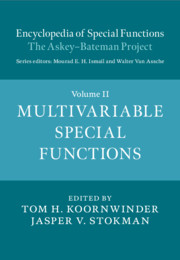Book contents
- Frontmatter
- Contents
- List of Contributors
- Preface
- 1 General Overview of Multivariable Special Functions
- 2 Orthogonal Polynomials of Several Variables
- 3 Appell and Lauricella Hypergeometric Functions
- 4 A-Hypergeometric Functions
- 5 Hypergeometric and Basic Hypergeometric Series and Integrals Associated with Root Systems
- 6 Elliptic Hypergeometric Functions Associated with Root Systems
- 7 Dunkl Operators and Related Special Functions
- 8 Jacobi Polynomials and Hypergeometric Functions Associated with Root Systems
- 9 Macdonald–Koornwinder Polynomials
- 10 Combinatorial Aspects of Macdonald and Related Polynomials
- 11 Knizhnik–Zamolodchikov-Type Equations, Selberg Integrals and Related Special Functions
- 12 9 j-Coefficients and Higher
- Index
12 - 9 j-Coefficients and Higher
Published online by Cambridge University Press: 30 September 2020
- Frontmatter
- Contents
- List of Contributors
- Preface
- 1 General Overview of Multivariable Special Functions
- 2 Orthogonal Polynomials of Several Variables
- 3 Appell and Lauricella Hypergeometric Functions
- 4 A-Hypergeometric Functions
- 5 Hypergeometric and Basic Hypergeometric Series and Integrals Associated with Root Systems
- 6 Elliptic Hypergeometric Functions Associated with Root Systems
- 7 Dunkl Operators and Related Special Functions
- 8 Jacobi Polynomials and Hypergeometric Functions Associated with Root Systems
- 9 Macdonald–Koornwinder Polynomials
- 10 Combinatorial Aspects of Macdonald and Related Polynomials
- 11 Knizhnik–Zamolodchikov-Type Equations, Selberg Integrals and Related Special Functions
- 12 9 j-Coefficients and Higher
- Index
Summary
The su(2) 3j-coefficients (or symbols) and higher ones as 6j and 9j play a crucial role in various physical applications dealing with the quantization of angular momentum. In this chapter, the hypergeometric expressions for these coefficients and their relations to discrete orthogonal polynomials are emphasized. We give a short summary of the relevant class of representations of the Lie algebra su(2), and discuss their tensor product. In the tensor product decomposition, the important Clebsch-Gordan coefficients appear. 3j-Coefficients are proportional to these Clebsch-Gordan coefficients. We give some useful expressions (as hypergeometric series) and their relation to Hahn polynomials. Next, the tensor product of three representations is considered, and the relevant Racah coefficients (or 6j-coefficients) are defined. The explicit expression of a Racah coefficient as a hypergeometric series of type 4F3 and the connection with Racah polynomials and their orthogonality is given.9j-Coefficients are then defined in the context of the tensor product of four representations. They are related to a discrete orthogonal polynomial in two variables. Finally, we consider the tensor product of (n+1) representations and generalized recoupling coefficients or 3nj-coefficients, determined by two binary coupling schemes.
Keywords
- Type
- Chapter
- Information
- Encyclopedia of Special Functions: The Askey-Bateman Project , pp. 402 - 419Publisher: Cambridge University PressPrint publication year: 2020



